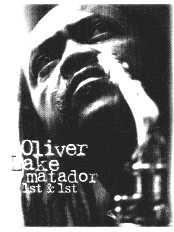|
The Matador of 1st & 1st |
 |
|
by Paul Klemperer
Under commercial pressures, jazz has often been isolated from related artistic expressions of the African American experience. But mixed media performances, often with the conscious goal of reclaiming the unity of creative action that is essential to the African aesthetic, are not a recent phenomenon in jazz. One can look back to the Harlem Renaissance of the 1920s, and arguably even before that, for examples of performance which combined music, dance, song and spoken word. The essential characteristic distinguishing these kinds of performance from more commercial cultural products is the emphasis on ritual, the creation of an extended moment in time and space in which all sights and sounds have an interconnected meaning.
Oliver Lake has a lot of experience in mixed media performance and in the use of performance as a ritual which creates its own space outside of everyday reality. Before becoming an integral part of the New York loft scene of the 1970s, Lake helped found the multi-disciplined Black Artist Group (B.A.G.) in the late 1960s in St. Louis, MO. His roots in mixed media performance go back at least thirty years. His one-man show, The Matador of 1st & 1st, is thus a continuation of a journey he began long ago.

The Matador was first performed in 1995 at Woody King's New Federal Theater in New York. Since then Lake has taken the show across the country, with sold-out performances in northern California earlier this year. The CD captures the aural if not the visual power of the stage performance in a set of 37 related pieces, ranging in length from 30 seconds to just over 4 minutes.
While the tracks can be enjoyed individually (particularly some of Lake's stellar sax and flute work), this is really one continuous performance and should be heard as such. It is a heady mix of avant-garde music, poetry, characterization and social commentary.
Oliver Lake is a storyteller, whether it be through his voice or his horn, and he clearly connects himself to the African traditions in this way. The Matador becomes a metaphor for the individual voice in the confusion of the modern world. As Lake puts it: "The Matador makin' his way thru traffic (life)...directing traffic his way...makin' the cars move the way he needs to move them...turning the life around...The Matador...survivor!"
|
||
top | this issue | ADA home |
||